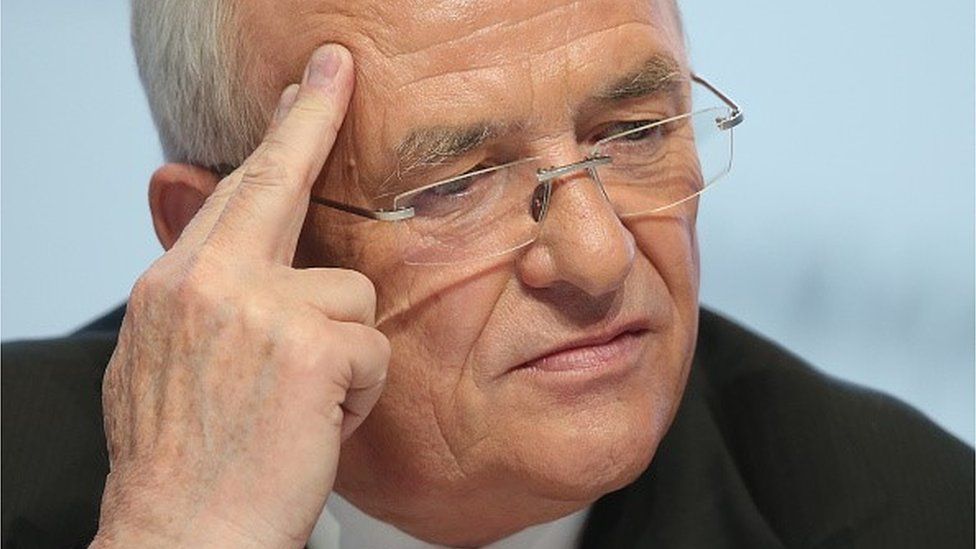VW boss Martin Winterkorn's rise and fall
- Published

As chief executive of the world's biggest carmaker, Volkswagen boss Martin Winterkorn enjoyed a prestige that extended well beyond the company's headquarters in the German city of Wolfsburg.
Last year, Forbes business magazine placed him 58th in its list of the world's most powerful people, comfortably ahead of the leaders of Mexico and Japan, although a few rungs below the head of the Islamic State militant group.
But in the light of subsequent events, its account of 68-year-old Mr Winterkorn's achievements appears to foreshadow his downfall.
Forbes said at the time that he "urged European regulators not to overburden the automotive industry with excessive emission targets, citing a lack of time to develop fuel-efficient technology and the economic downturn as major concerns".
The piece went on to say that "the topic is especially close to [Mr] Winterkorn". If it wasn't then, observers might say, it certainly is now, given the scandal over the rigging of emissions test results for VW's diesel-powered cars in the US.
The VW chief apologised twice over for the deception, even going to the lengths of issuing a video statement in which he said that he was "utterly sorry".
But it was not enough to save his job, as he was forced to step down just a day later.
"Volkswagen needs a fresh start - also in terms of personnel," he said in a statement. "I am clearing the way for this fresh start with my resignation."
Leadership challenge
Mr Winterkorn had been at the helm of Volkswagen since the beginning of 2007, but this year it all turned sour.
The emissions crisis that forced him out came just five months after he saw off another challenge to his leadership. On that occasion, however, internal company politics, not external regulators, were at the heart of the matter.
For reasons which remain unclear, the company's chairman at the time, Ferdinand Piech, moved against Mr Winterkorn, expressing critical views of him in an interview with Der Spiegel news magazine.
Until that point, the two men had been seen as close allies. But according to unconfirmed reports, the bone of contention was the firm's difficulties in cracking the US market - again, a point that appears prophetic when viewed in retrospect.
The dispute between the two men caused ructions within the car giant's complex power structure.
Mr Piech must have been confident of winning the battle, since he is part of the Porsche family, which controls nearly 51% of VW.
But Wolfgang Porsche, a member of the five-strong executive committee and a cousin of Mr Piech, said he had given his "personal opinion" without clearing his remarks with other family members.
In the end, Mr Piech had to step down after the board gave its backing to Mr Winterkorn, as did trade union leaders and politicians.
Volkswagen's top decision-makers
Mr Winterkorn submitted his resignation to the executive committee of the VW supervisory board, which is made up of five people. It includes:
- Wolfgang Porsche, head of the Porsche family and chairman of Porsche Automobil Holding, which has a majority of voting rights (50.7%)
- Stefan Weil, president of the government of Lower Saxony (20% of votes)
- Berthold Huber, representative of union IG Metall
- Bernd Osterloh, chairman of VW works council
- Stephan Wolf, vice-chairman of the works council
Career engineer
Before ascending to the pinnacles of management, Mr Winterkorn had a strong track record in engineering.
He spent a lengthy period of time as a student, as many Germans do, and was pushing 30 when he received his doctorate in metal physics and got his first job at the Bosch electronics conglomerate.
He moved to VW in 1993 as head of group quality assurance, rising swiftly through the ranks from then on.
He became heavily involved with technical development, both at VW and at its Audi subsidiary, and is given credit for his key role in getting the top brass to put the revived Beetle into production.
On his way up, he became determined to take on all comers, vowing to turn VW into the world's biggest car company, at a time when Toyota and General Motors appeared to be the main contenders.
Earlier this year, his wish finally came true when figures for the first half of 2015 showed that VW had outstripped Toyota in global vehicle sales.
Now that victory is starting to look hollow. And it could be unsustainable, too, given that the emissions scandal has probably inflicted lasting reputational damage on the VW brand.
- Published23 September 2015
- Published10 December 2015
- Published22 September 2015
- Published22 September 2015
- Published22 September 2015
- Published19 September 2015
- Published18 September 2015
- Published16 September 2015